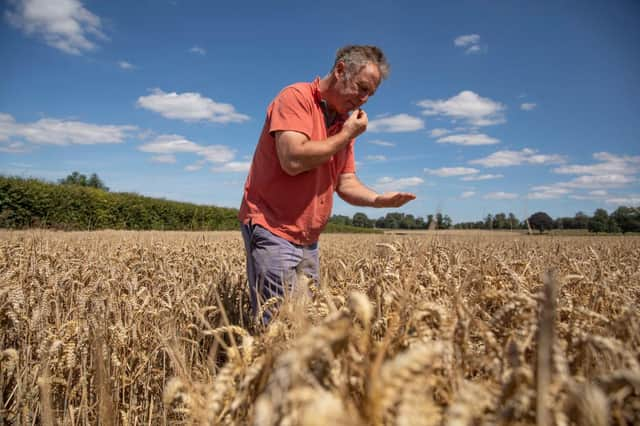Giving us our daily bread may become trickier - Brian Henderson


And I have a sneaking suspicion that this might be case today – with the fantastic weather of the past week or so set to last for a few days more, most arable farmers will be far too busy on their tractors and drillers to have time to read the paper.
Likewise, with much of the other half of the farming sector up to its elbows in the squishier parts of ewes as lambing takes centre stage, they too probably have more immediate things on their minds.
Advertisement
Hide AdAdvertisement
Hide AdIt’s certainly good that the industry has had at least some co-operation from the weather as there’s a fair old feeling out there that pretty much everything else is conspiring to keep us constantly on our toes, with an endless stream of surprises and economic challenges queuing up to make sure life remains interesting.
Busy with drilling, calving and the build up to lambing ourselves it’s actually quite a relief to be able to get out there and lose yourself in the physical aspects of the job, joining the push to get as much as possible done while the weather holds.
Inevitably, though, even if you can convince yourself that you’re too busy to open those bills piling up on the office desk or in the e-mail in-box, the precarious nature of things still impinges on the consciousness at some stage.
This can happen when you’re filling up the tractor with fuel- and you suddenly realise with some trepidation that each of the several hundred litres of fuel clicking over on the meter will cost well over a quid to replace.
Similarly twigging to the fact that every 600kg bag of fertiliser loaded into the ferti-spreader is, however much you actually paid for it, is likely to have a replacement value of around £600.
It’s true that there might be prospect of a higher rate of return at the end of the season for this not inconsiderable investment - as the possibility of world shortages are currently seeing grain prices riding high at the moment.
As even media outlets which would never normally dream of reporting on the farming scene – other than to portray the industry as intent on destroying the environment – have realised that the war in Ukraine will have serious knock on consequences for global wheat production, not only by halting movement from Black Sea ports at a time when stocks are already low, but also in world-wide production as both Russia and their partners in crime, Belarus, play a significant role in supplying or facilitating world fertiliser production.
So there has been a realisation that it might not be quite so easy for the bakers to give us our daily bread.
Advertisement
Hide AdAdvertisement
Hide AdBut while a speaker from the Bank of England recently raised the prospect of the £3 loaf as a the sort of spectre which would haunt our politicians, the real damage is already being felt in developing countries where the current increases in the price of wheat is making it difficult to source – and already leading to shortages on shop shelves. The last time there was a similar spike in prices resulted in political unrest and the so-called Arab Spring - which saw major upheaval in the Middle East.
It’s an uncomfortable fact in the farming world, though, that the vicissitudes of global trade mean we only see any major rise in prices as a result of problems and hardships in other parts of the world, where war, drought, flood or other disasters dent the usually plentiful supply of what we produce.
So it was a bit galling to see a big piece in the Financial Times the other day, questioning whether speculators should be investing or hedging in the agricultural commodity market.
It could be argued that such outside interest in these highly specific markets can push up prices in the short term – and by so doing encourage a huge increases in production which, in consequence, will help reduce any shortfall in world stocks.
But in any huge swings in commodity markets there are always winners and losers – and we all know that in most cases it’s the actual producers who are left to carry the can when the market collapses again a few years down the line.
A message from the Editor
Thank you for reading this article. We're more reliant on your support than ever as the shift in consumer habits brought about by coronavirus impacts our advertisers. If you haven't already, please consider supporting our trusted, fact-checked journalism by taking out a digital subscription. Click on this link for more information.
Comments
Want to join the conversation? Please or to comment on this article.
